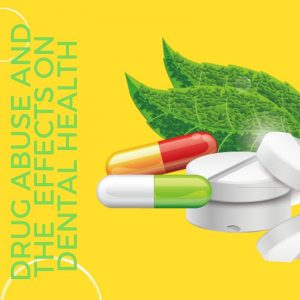More than 570,000 people in North Carolina — or 6.3 percent of North Carolinians over age 12 — are living with a substance use disorder. September is National Recovery Month.
The Centers for Disease Control and Prevention (CDC) notes that, in 2014, 10.2 percent of Americans, ages 12 and older, reported some type of illicit substance abuse in the past month.
About 23.4 percent of American adults, ages 18 and older, engaged in at least one heavy drinking day in the past year. People who regularly consume intoxicating substances, from alcohol to opioids, put themselves at high risk of suffering physical harm.
While many people who think of drug abuse imagine the damage to the lungs, stomach, heart, or brain, many types of drugs damage the teeth and gums. People who struggle with addiction spend a great deal of their time intoxicated on drugs or trying to acquire more drugs; this means that they often neglect oral hygiene because they cannot afford a dentist or they simply stop caring about brushing their teeth.
There are several ways that each drug can, individually, damage oral health. Here are the most common ways that addictive drugs can generally harm the mouth and teeth:
- Dry mouth, which increases acid in the mouth and leads to rotting enamel
- Acid reflux, which also rots enamel and hurts soft tissue
- Grinding teeth
- Loss of blood flow to roots and gums
- Ulcers or sores in the mouth that can become infected
- A focus on attaining more drugs instead of caring for oral hygiene
- Nutritional deficiencies that can damage teeth and gums
- Greater intake of high-sugar food or beverages, which rots teeth
Drugs That Affect Oral Health
Most people know from public health advertisements that meth abuse damages teeth; however, they may not know how this occurs, how quickly it can happen, or that other drugs can damage oral health. Below are drugs that are most often associated with damage to the teeth, gums, jaw, and oral hygiene:
- Cocaine: This potent stimulant affects the mouth, although it can cause different damage depending on how the drug is taken. It is very acidic, so if cocaine comes in contact with teeth, it will break down the enamel. Crack cocaine is the most common offender since it is smoked, although some people put powdered cocaine in their mouths to be absorbed by their gums. Rubbing the powdered version into the gums also leads to mouth sores, which can become infected. Snorting powdered cocaine damages the tissues in the upper palate, which may eventually cause a hole to form between the nose and mouth. Cocaine may cause a movement disorder called transient chorea; this can manifest in the jaw and mouth-related muscle spasms called buccolingual dyskinesia, which can look like grinding the teeth or a strange smile. Grinding the teeth can crack them and cause damage to the enamel, the surrounding gums, and the jaw.
- Meth: Poor dental health is associated with meth use in a condition colloquially called meth mouth, as this drug rots teeth very quickly. Meth causes blood vessels to shrivel and die, and this causes problems in the gums. Meth also makes the mouth dry out, and without saliva, other acids in the mouth wear away enamel. Since the drug is a stimulant, it causes people who take it to grind their teeth due to stress; people who struggle with meth addiction also crave sugary foods and drink, which can damage oral hygiene. One study, conducted by students at the University of California, Los Angeles, found that 96 percent of people who struggled with meth abuse had cavities; 58 percent had untreated tooth decay, and 31 percent has six or more missing teeth.
- Amphetamines: So-called club drugs, like ecstasy, MDMA, molly, and derivatives of these amphetamines, cause the person who takes them to grind their teeth, which can cause teeth to crack. The action can also damage the jaw. These stimulant drugs cause dry mouth and can lead to dehydration, which can damage teeth, their enamel, and other structures in the mouth.
- Alcohol: This legal, but addictive, intoxicating substance is made from fermented sugars and may have additional sugar added later. This can lead to a faster buildup of plaque. Alcoholics also acidic, so the combination can quickly lead to tooth decay. Acid reflux can bring up stomach acids that may further wear away at the teeth. Red wine, brown liquors, and alcohol with other colorants can stain teeth, which can be unsightly.
- Opioids and opiates: Heroin causes people to crave sugary foods or soda, which can damage teeth and their roots. Although opioids and opiates are not stimulant drugs, they can cause users to grind their teeth, which cracks teeth and damages the jaw. Those who inject these drugs put themselves at higher risk for many infections, which can cause oral fungus or viral infections that affect the mouth. Since opioids also reduce pain, the associated loss of sensitivity could lead to the person ignoring the pain from cavities or gum disease. Unfortunately, dental surgery may lead to opioid addiction, for some people. Oral surgery to correct dental problems is common, and dentists typically prescribe a course of opioid painkillers after surgery. While these are milder opioids like Percocet or Vicodin, the drugs may still trigger addiction for some individuals. The American Dental Association recently issued guidelines for opioid prescriptions to help dentists become more aware of their role in the opioid addiction epidemic.
- Marijuana: Smoking anything, including marijuana, can lead to cancer in the mouth. This drug is also known to cause dry mouth, which can, like meth, wear away at enamel due to an imbalance of acids in the mouth. Additionally, a syndrome called cannabinoid hyperemesiscan occur; this condition causes vomiting, and if a person vomits frequently, stomach acid can wear away at the enamel of the teeth, causing cavities and decay.
- Tobacco: Like marijuana, smoking cigarettes or pipes can cause oral or throat cancer. Chewing tobacco also puts the individual at risk of these cancers. Most forms of tobacco can lead to dry mouth, which can lead to halitosis, gum disease, and damage. People who smoke are twice as likely to have periodontal (gum) disease, and the presence of the drug makes the condition harder to treat.
- Prescription and OTC drugs: Antihistamines and drugs containing aspirin, whether over-the-counter medications or prescription drugs, may cause damage to structures in the mouth. Aspirin causes tooth damage and decay when a person takes too much or when they chew pills instead of swallowing them whole; antihistamines can lead to gum problems from dry mouth. Prescription asthma medications can be acidic while oral contraceptives, immunosuppressant drugs, and medicated cough syrups can cause gum problems due to dry mouth. Cough syrups also contain sugar, in many cases, which will rot tooth enamel.
Damage to oral health means that teeth may be lost, and gum disease could cause lasting harm to the mouth. This could make eating difficult even after drug use has stopped, and it can damage a person’s self-esteem, which can make emotional recovery from substance abuse harder. Getting help with detox, then entering a rehabilitation program, can help a person overcome addiction. Oftentimes, treatment centers can assist clients in finding dental specialists who can address their oral health problems.
Article from: https://americanaddictioncenters.org/health-complications-addiction/dental-health
Last Updated on September 3, 2019


